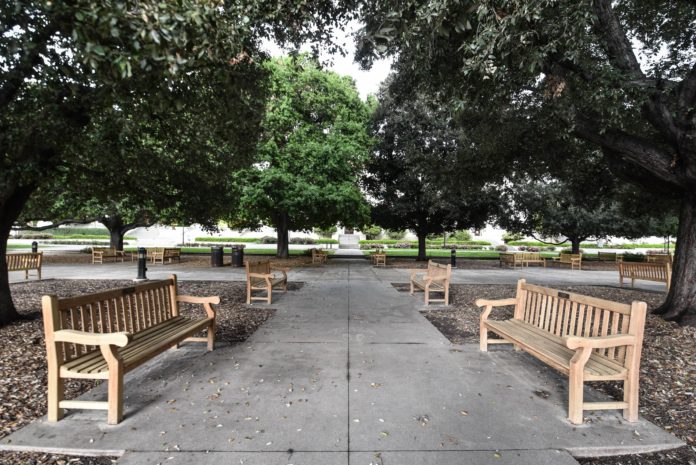Students will vote on the confirmation of amendments to the Associated Students of Occidental College (ASOC) constitution and elect student representatives for the Fall 2020 semester in the current student election, which closes April 27. According to ASOC president Nina Srdić Hadži-Nešić (junior), the new constitution will restructure ASOC to more equally distribute power across all branches through the creation of an ASOC executive committee. In response to the proposed constitution change, students have raised concerns regarding the timing, reach and specifics of the new policies.
“I think the most important thing to understand is that this can only help ASOC officers — no matter what branch — to really advocate for student concerns more strongly to the administration and to really be seen by the administration,” Srdić Hadži-Nešić said. “It’ll give more power to ASOC officers to really fight for students and put equity in the forefront.”
ASOC Senate Vice President of Policies Kyler Parris (sophomore) led the ASOC constitutional commission. According to Parris, if the constitutional amendments pass, the proposed executive committee will meet once every two weeks and consist of two representatives from each ASOC branch, the ASOC president and a newly-established finance director position.
“By changing the ASOC structure, we’re hoping to reach some sort of shared government, increase inter-branch collaboration [and] be more responsive as a student government to the needs of the students of the institution,” Parris said. “I think we operate too slowly as is now, with four different branches doing their own thing.”
If the constitutional amendments are passed, this new committee will allocate student fee money, oversee student services and control ASOC’s finances, all of which are currently controlled by ASOC Senate.
Linda Schraeder, ASOC finance manager, said the new constitution could also cause confusion about student fees and the allocation of different ASOC budgets. Three separate student fees are collected for Diversity Equity Board (DEB), Renewable Energy and Sustainability Fund (RESF) and the overall ASOC budget, according to Schraeder.
“The difference is DEB will no longer have their own fee, same for [RESF], and that means it’s now going to be allocated by the finance director,” Schraeder said.
Srdić Hadži-Nešić said she believes the new constitution works towards equal and shared power across all branches of ASOC.
“The way it has been set up historically, most of the funds, money and access to savings and investment funds as well as the rights to make [the] largest decisions has been concentrated in only one branch, which is Senate,” Srdić Hadži-Nešić said. “Now it’s really time to share that power on highest decision-making in ASOC with other branches as well.”
Wafa Abedin (junior), former ASOC vice president of internal affairs, wrote the current version of the constitution, which was confirmed by student election April 19, 2019. Abedin raised concerns about the new amendments on Twitter and in an email to ASOC April 24. Under the drafted amendments, the constitution would not have term limits for the ASOC president nor the finance director and would not provide any way of removing students in those positions from office, according to Abedin’s email. As a member of Senate, the president of ASOC is currently subject to a one year term limit and can be impeached through evaluation by Honor Board if a motion is brought forward by any other member of Senate. If the constitutional amendments are passed, the ASOC president would no longer be within Senate. The original student election ballot included a “too long; didn’t read” summary of the constitutional amendments which urged students to vote yes on the changes. The ballot was updated to remove that language April 26.
“They’re creating this whole new branch — they call it a committee but really it’s a branch — without ever having detailed what the procedures are,” Abedin said. “I feel like it’s important, if you’re creating a new branch, to know what exactly their powers are gonna be and how they’re going to operate. They’re saying, ‘Hey trust us, we’re gonna come up with the best bylaws that we can,’ and frankly, if they forgot to put term limits in the constitution, I don’t trust them to do that.”
Abedin said she was also concerned about transparency in the drafting process because the constitutional committee meeting minutes have not been published for any meetings during the 2019–2020 academic year. ASOC Senate has not published meeting notes since November 2019, and the student body was notified via an email from Srdić Hadži-Nešić about the constitution appearing on the ballot less than an hour before voting opened at 11:03 p.m. PDT April 23. According to Srdić Hadži-Nešić, this was because issues with the ASOC listerv had prevented Parris from sending a message to the student body earlier.
Voting for student elections opened April 24 and will close April 27. In order for the constitutional amendments to be confirmed, it must reach two-thirds majority vote in favor with at least 405 students voting.
This article was revised April 26 at 11 a.m. to include clarifications sent by Nina Srdić Hadži-Nešić and Kyler Parris.
![]()




































